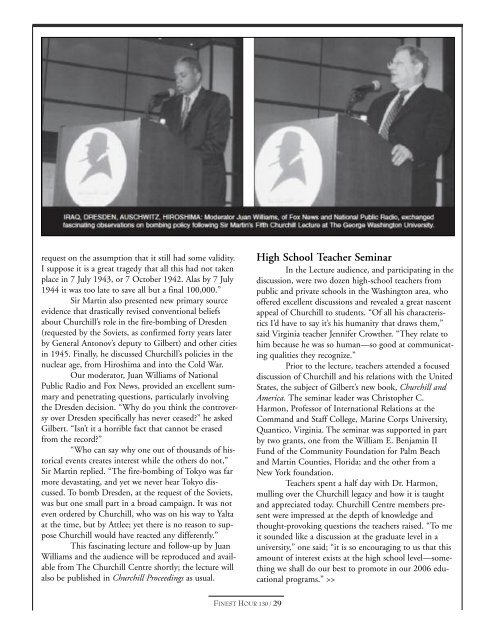SPRING 2006 ⢠NUMBER 130 - Winston Churchill
SPRING 2006 ⢠NUMBER 130 - Winston Churchill
SPRING 2006 ⢠NUMBER 130 - Winston Churchill
- No tags were found...
Create successful ePaper yourself
Turn your PDF publications into a flip-book with our unique Google optimized e-Paper software.
equest on the assumption that it still had some validity.I suppose it is a great tragedy that all this had not takenplace in 7 July 1943, or 7 October 1942. Alas by 7 July1944 it was too late to save all but a final 100,000.”Sir Martin also presented new primary sourceevidence that drastically revised conventional beliefsabout <strong>Churchill</strong>’s role in the fire-bombing of Dresden(requested by the Soviets, as confirmed forty years laterby General Antonov’s deputy to Gilbert) and other citiesin 1945. Finally, he discussed <strong>Churchill</strong>’s policies in thenuclear age, from Hiroshima and into the Cold War.Our moderator, Juan Williams of NationalPublic Radio and Fox News, provided an excellent summaryand penetrating questions, particularly involvingthe Dresden decision. “Why do you think the controversyover Dresden specifically has never ceased?” he askedGilbert. “Isn’t it a horrible fact that cannot be erasedfrom the record?”“Who can say why one out of thousands of historicalevents creates interest while the others do not,”Sir Martin replied. “The fire-bombing of Tokyo was farmore devastating, and yet we never hear Tokyo discussed.To bomb Dresden, at the request of the Soviets,was but one small part in a broad campaign. It was noteven ordered by <strong>Churchill</strong>, who was on his way to Yaltaat the time, but by Attlee; yet there is no reason to suppose<strong>Churchill</strong> would have reacted any differently.”This fascinating lecture and follow-up by JuanWilliams and the audience will be reproduced and availablefrom The <strong>Churchill</strong> Centre shortly; the lecture willalso be published in <strong>Churchill</strong> Proceedings as usual.High School Teacher SeminarIn the Lecture audience, and participating in thediscussion, were two dozen high-school teachers frompublic and private schools in the Washington area, whooffered excellent discussions and revealed a great nascentappeal of <strong>Churchill</strong> to students. “Of all his characteristicsI’d have to say it’s his humanity that draws them,”said Virginia teacher Jennifer Crowther. “They relate tohim because he was so human—so good at communicatingqualities they recognize.”Prior to the lecture, teachers attended a focuseddiscussion of <strong>Churchill</strong> and his relations with the UnitedStates, the subject of Gilbert’s new book, <strong>Churchill</strong> andAmerica. The seminar leader was Christopher C.Harmon, Professor of International Relations at theCommand and Staff College, Marine Corps University,Quantico, Virginia. The seminar was supported in partby two grants, one from the William E. Benjamin IIFund of the Community Foundation for Palm Beachand Martin Counties, Florida; and the other from aNew York foundation.Teachers spent a half day with Dr. Harmon,mulling over the <strong>Churchill</strong> legacy and how it is taughtand appreciated today. <strong>Churchill</strong> Centre members presentwere impressed at the depth of knowledge andthought-provoking questions the teachers raised. “To meit sounded like a discussion at the graduate level in auniversity,” one said; “it is so encouraging to us that thisamount of interest exists at the high school level—somethingwe shall do our best to promote in our <strong>2006</strong> educationalprograms.” >>FINEST HOUR <strong>130</strong> / 29
















